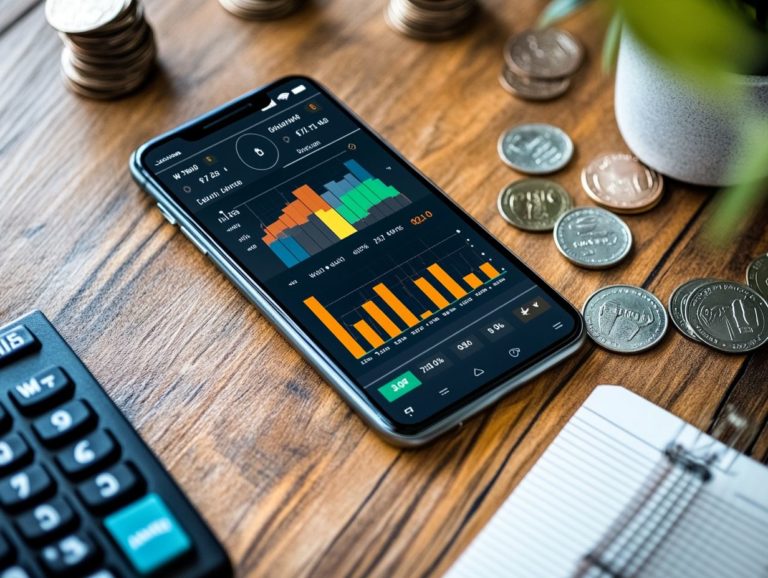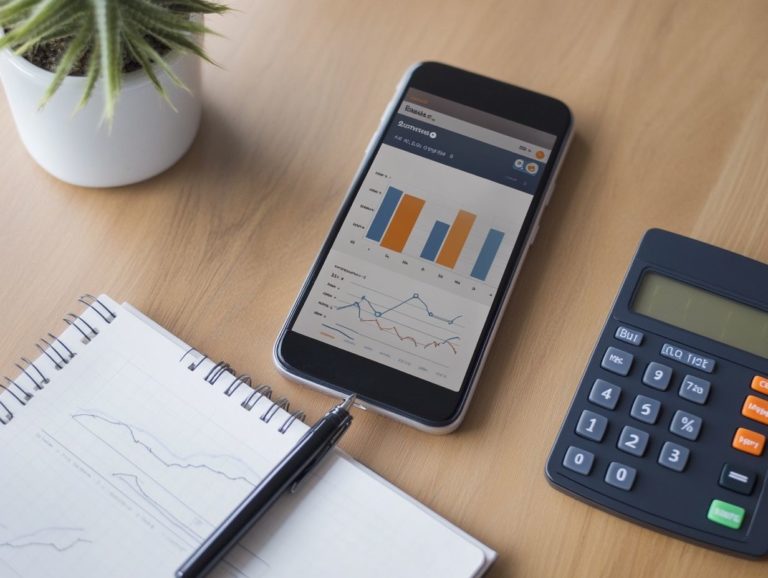How to Set Financial Goals with Budgeting Tools
Setting financial goals is crucial for achieving long-term stability and success. But how do you effectively define and prioritize these goals?
This article delves into the essential role of budgeting in this process, showcasing both traditional and digital tools that will help you stay on track. You ll discover a step-by-step guide for utilizing these tools, along with tips to maintain your momentum. We will also identify common pitfalls so you can keep your focus sharp on your financial journey.
Contents
- Key Takeaways:
- Understanding Financial Goals
- The Importance of Budgeting
- Types of Budgeting Tools
- How to Use Budgeting Tools to Set Financial Goals
- Tips for Sticking to Your Financial Goals
- Common Mistakes to Avoid
- Pitfalls to Watch Out For
- Frequently Asked Questions
- What are budgeting tools and how can they help me set financial goals?
- How do I use budgeting tools to set financial goals?
- Can I customize my financial goals in budgeting tools?
- How often should I review and adjust my financial goals in budgeting tools?
- Are there any free budgeting tools available?
- Can budgeting tools help me save money and reach my financial goals faster?
Key Takeaways:

- Prioritize your financial goals by defining them clearly and setting them in order of importance.
- Budgeting is crucial in achieving financial goals as it helps in managing expenses, saving money, and tracking progress.
- Use traditional or digital budgeting tools to set and achieve financial goals by following a step-by-step guide and staying accountable.
Understanding Financial Goals
Understanding your financial goals is an essential step in your journey toward financial success. These goals serve as a clear roadmap, guiding you in making informed financial decisions.
Whether your aim is to pay off debt, establish a robust emergency fund, save for retirement, or invest wisely, setting specific and measurable goals enables you to track your progress. Financial planning requires you to identify both short-term and long-term objectives, create actionable steps, and visualize your budget with tools, all of which are crucial for achieving your desired financial outcomes.
Defining and Prioritizing Goals
Defining and prioritizing your financial goals is essential for creating a plan that guides you toward financial independence and security.
This process starts with clearly identifying your short-term and long-term objectives, helping you pinpoint exactly what you want to achieve. Whether it’s saving for a vacation or planning for retirement, these goals should be specific and measurable.
Once you have a clear list, it’s crucial to prioritize them based on your personal circumstances, needs, and timelines. By assessing the urgency and importance of each goal, you can create a hierarchy that clarifies your focus. Accountability is key in this journey; regularly reviewing your progress against these realistic goals will not only boost your motivation but also ensure you make necessary adjustments along the way.
Ultimately, this approach will lead you toward the financial future you envision.
The Importance of Budgeting
Budgeting serves as an essential instrument in personal finance, giving you the power to take control of your financial decisions. By effectively tracking your expenses, managing your savings, and planning for the future, you can significantly enhance your financial security.
Budgeting also increases your awareness of your financial landscape but also positions you to make informed choices that pave the way for a more stable and prosperous financial future.
Benefits of Budgeting
The benefits of budgeting extend far beyond mere expense tracking; they are essential in enhancing your financial well-being and achieving your long-term financial aspirations.
By embracing a structured financial plan, you can elevate your money management skills, giving you the power to make informed financial decisions. This proactive approach not only helps you pinpoint unnecessary expenses but also encourages you to save for your future dreams, whether that’s buying a home or planning for retirement.
Maintaining a budget fosters accountability and discipline, keeping you aligned with your objectives. Ultimately, this leads to greater financial security, granting you peace of mind and alleviating the stress that often accompanies financial uncertainties. Start budgeting today to secure your financial future!
Types of Budgeting Tools

You ll find a diverse array of budgeting tools at your fingertips, each tailored to suit different preferences. Whether you prefer the classic charm of pen-and-paper budgeting or the convenience of cutting-edge digital tools aimed at streamlining your financial planning and expense tracking, there s something available for everyone.
Traditional vs. Digital Tools
When you compare traditional budgeting tools to their digital counterparts, you’ll find that each offers unique advantages that can elevate your financial planning and simplify expense tracking.
If you re someone who enjoys a hands-on approach, traditional methods like pen-and-paper ledgers can create a meaningful connection to your finances, encouraging mindfulness and discipline in your spending habits.
Conversely, digital budgeting tools provide the luxury of real-time data access and automation, allowing you to track expenses effortlessly and analyze your spending patterns whenever you choose.
These modern solutions often come with features like alerts for overspending and visual graphs that illustrate your progress toward financial goals, which can be especially valuable if you seek immediate feedback on your financial behaviors.
Ultimately, the decision between traditional and digital budgeting hinges on your personal preferences, lifestyle, and specific financial aspirations.
How to Use Budgeting Tools to Set Financial Goals
Utilizing budgeting tools effectively will skyrocket your ability to set and achieve financial goals. By establishing a clear plan, these tools outline easy steps you can take that pave the way toward your financial success.
Step-by-Step Guide
A systematic approach using budgeting tools can truly streamline your journey toward achieving financial goals and tracking your progress over time.
To get started, explore various budgeting apps and customizable spreadsheets that cater to your unique needs. These platforms allow you to easily input your income and expenses, providing visual representations of your financial data that clarify where your money is flowing.
Once you’ve set everything up, it’s crucial to outline specific and measurable objectives, such as saving for that dream vacation or paying off debt. Scheduling regular reviews perhaps on a monthly basis will enable you to evaluate your progress against these goals effectively.
If you find adjustments are necessary, whether it’s cutting back on non-essential expenses or reallocating your savings, these tools can support you in making informed decisions. Additionally, learning how to stay accountable with budgeting tools can enhance your accountability, ensuring that your financial aspirations remain front and center in your mind.
Tips for Sticking to Your Financial Goals
Adhering to your financial goals demands unwavering commitment, a sense of accountability, and the cultivation of effective financial habits.
These practices are essential for fostering sustainability and ensuring long-term success in your financial journey.
Accountability and Tracking Progress

Establishing accountability and tracking progress are essential elements in successfully achieving your financial goals; they ensure you stay committed and motivated throughout your financial journey.
Elevate this commitment through regular check-ins, where you assess your financial habits and adapt your strategies as needed. Utilizing tools like budgeting apps or spreadsheets can offer visual representations of your progress, making it easier to stay on course. Sharing your financial ambitions with friends or family can create a supportive community, fostering a network that encourages consistent assessments and reinforces good habits.
By routinely measuring your advancements and recalibrating your goals, you not only maintain motivation but also cultivate a resilient financial mindset that is crucial for long-term success.
Common Mistakes to Avoid
Avoiding common mistakes in financial planning is crucial for successfully achieving your financial goals and maintaining a robust financial outlook. By being mindful of potential pitfalls, you position yourself to navigate your financial journey with confidence and clarity.
Take charge of your financial future today! Start using budgeting tools effectively right away to make informed decisions and reach your financial aspirations.
Pitfalls to Watch Out For
Avoid these pitfalls to keep your financial journey on track! When you’re striving to reach your financial goals, it’s essential to be mindful of the common pitfalls that can impede your progress and negatively affect your financial health.
Poor budgeting practices can lead you down the path of overspending and overlooked expenses. This creates a financial gap that might feel overwhelming.
If you neglect to regularly assess your goals, you risk a disconnect between your aspirations and how well you are doing with money. Without consistent evaluation, you may chase unrealistic targets or miss opportunities for adjustment as circumstances change.
This cycle can drain your motivation and throw you off track!
By establishing sound financial habits like tracking your spending, creating a flexible budget, and frequently revisiting your goals you can ensure a steadier path to success and cultivate a healthier financial mindset.
Frequently Asked Questions
What are budgeting tools and how can they help me set financial goals?
Budgeting tools are software or apps that help you track your income and expenses. They provide a clear picture of your current financial situation and assist you in creating a plan to reach your goals.
How do I use budgeting tools to set financial goals?
Start by inputting all your income and expenses into the budgeting tool. Then, analyze your spending habits and identify areas where you can cut back.
Use the tool to set realistic and achievable financial goals based on your income and expenses.
Can I customize my financial goals in budgeting tools?
Yes, most budgeting tools allow you to set custom financial goals. You can specify the amount you want to save, the timeframe for achieving it, and even categorize your goals (e.g., emergency fund, vacation fund). To effectively manage this process, learn how to set realistic budget goals.
How often should I review and adjust my financial goals in budgeting tools?
It’s recommended to review your financial goals at least once a month. This will allow you to track your progress and make necessary adjustments.
You can review and adjust your goals more frequently if needed.
Are there any free budgeting tools available?
Yes, many free budgeting tools are available online. Some popular ones include Mint, Personal Capital, and EveryDollar. For those looking to enhance their budgeting experience, exploring the best tools for tracking financial goals can provide additional features to help you set financial goals without any cost.
Can budgeting tools help me save money and reach my financial goals faster?
Yes, budgeting tools can help you save money by giving you a clear overview of your expenses and helping you identify areas where you can cut back.
By sticking to a budget and consistently working towards your financial goals, you can reach them faster and achieve financial stability. Consider learning how to set goals that align with financial values to enhance your strategy.




